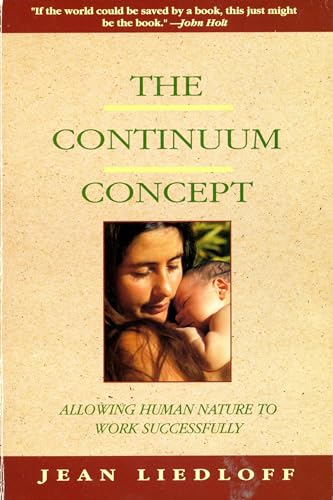The Continuum Concept
In Search Of Happiness Lost (Classics in Human Development)
Jean Liedloff
BOOK REVIEW

The first time you hear about The Continuum Concept: In Search Of Happiness Lost by Jean Liedloff, it feels like a revelation waiting to crash into your consciousness. This seminal work, a blend of anthropology, psychology, and sheer common sense, challenges everything you think you know about happiness, child-rearing, and the inherent nature of our existence. Published in 1986 and drawing on Liedloff's experiences with the Yequana people of Venezuela, the book provocatively questions modern parenting practices, encouraging a return to our instinctual roots for a more fulfilling life.
Liedloff's exploration is not just academic; it is intensely personal. She paints a vivid portrait of the Yequana tribe's harmonious existence, where children are not merely raised but enveloped in a tapestry of love, community, and instinctual nurturing. As you delve into Liedloff's experiences, the vibrant imagery she conjures will make you yearn for the lost simplicity, a world where happiness is not something you chase but rather a state of being you inhabit from birth. This is a book that plunges deep into the human soul, exposing the cracks formed by our departure from natural living.
Can you feel the weight of societal expectation pressing down on your shoulders? That constant rush to succeed, the pressure to conform - it's suffocating. Liedloff urges you to consider that this chase for a manufactured happiness may have roots in a misguided upbringing. Her observations reveal a shocking truth: modern children growing up in our sanitized society often become anxious and insecure, disconnected from their inherent right to feel safe, loved, and accepted. A striking contrast to the Yequana way of life, where every child is allowed to thrive in a lush environment of care and intuitive nurturing.
The emotional rollercoaster you experience while reading can be staggering. Joy mingles with melancholy; you're filled with an exhilarating desire for change, but also a heart-wrenching nostalgia for what has been lost. Liedloff's words resonate profoundly, echoing through the ages to remind us that radical lifestyle shifts are not just possible but essential. Imagine-no, feel-the liberation that comes when you realize happiness is fundamentally about relationships, communication, and understanding, rather than possessions or accolades.
This book is not without its controversies. Readers are polarized; some praise it as a clarion call for a return to natural parenting, while others critique it for romanticizing a primitivist ideal that may not align with contemporary contexts. Yet, within this discourse lies the essence of The Continuum Concept. It compels you to confront your own beliefs and biases. Are you willing to question your upbringing, the societal norms that bind you? The conflicting opinions only serve to heighten your engagement with Liedloff's profound insights, as you grapple with these complex truths.
The yearning for connection, for authenticity, is palpable in her work, invoking powerful responses. What would your life look like if you prioritized instinct, community, and emotional bonds over the relentless pursuit of success? Readers often report a sense of awakening or revelation, feeling as though they have been granted admission into a secret garden of wisdom, long hidden from the hustle and bustle of modern existence.
And then, there's the atmosphere of urgency that radiates from her prose. Each page ignites a fervent need for change, an almost frenetic desire to reclaim the joy of living; the fear of missing out on the secrets of life's happiness may grip you fiercely. What lessons are you leaving untapped by clinging to outdated norms? As you navigate this stunning work, every word has the power to challenge, inspire, and provoke emotions that resonate deeply within your very core.
Liedloff's work doesn't just conclude; it demands action. It whispers the potential for a better world, one built on cooperation, connection, and collective well-being. You can't help but ponder who else has been influenced by her pioneering insights. Think about how many parents, educators, and even politicians have grappled with her ideas, attempting to forge a more compassionate society. Whether you agree with her or not, the impact of The Continuum Concept on contemporary discussions around parenting and happiness cannot be understated.
The realization that happiness might not be a passive state, but rather an active choice that can be nurtured, will leave you restless. Are you ready to explore your own continuum? The journey might be daunting, but it's essential. The Continuum Concept goes beyond mere pages; it's a manifesto for living authentically in a world that often forgets the importance of primal connections. Dive in, unearth your instincts, and embark on your unique journey toward happiness. You'll never look at life-or your role in it-the same way again. 🌟
📖 The Continuum Concept: In Search Of Happiness Lost (Classics in Human Development)
✍ by Jean Liedloff
🧾 192 pages
1986
#continuum #concept #search #happiness #lost #classics #human #development #jean #liedloff #JeanLiedloff